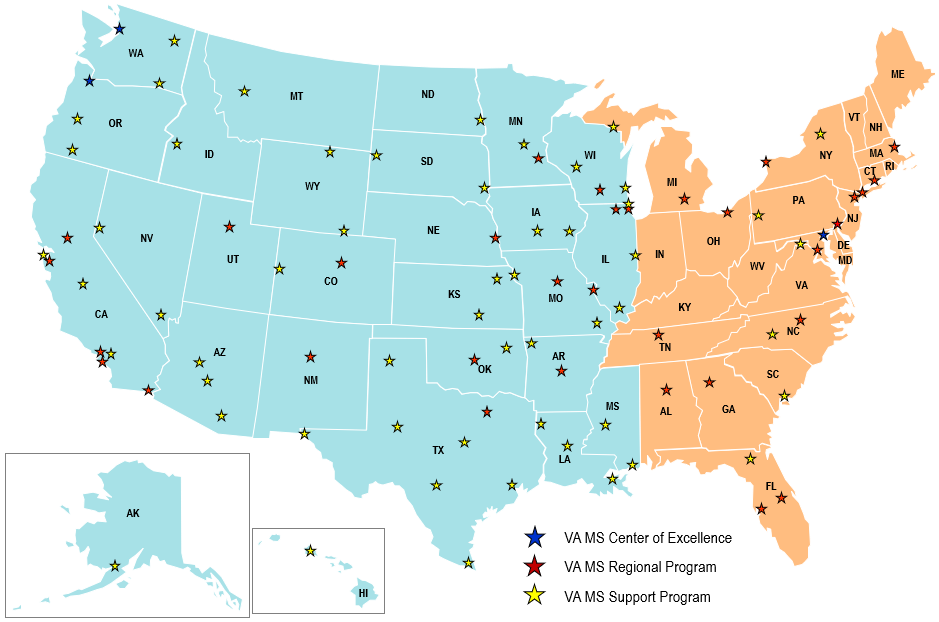WASHINGTON — The VA’s Multiple Sclerosis Centers of Excellence (MSCoE) offer a wide range of services for veterans affected by the neurological condition and ensures veterans have access to high quality care wherever they are. Two coordinating centers, the MSCoE East in Baltimore and the MSCoE-West, jointly located in Seattle and Portland, Ore., establish national standards, collaborate with the VA’s regional programs at the VISN level and local support programs, lead research into the disease and support veterans with MS and the clinicians who provide their care around the country.
“Our mission is really to support and maintain the health, independence, quality of life and productivity of veterans with MS,” said Maggie Kazmierski, MSW, of the VA MSCoE-East in a recent webinar for veterans with the disease. “We do that through four pillars. One of them being clinical care and that is through improving our clinical services for veterans with MS by fostering an integrated network of health services within the entire VA Healthcare System. We also look at education and training, providing national programs of MS education for our VA health care providers, our veterans and our caregivers. We also look at informatics …. And lastly, of course, we look at research and developments, conducting, disseminating, and really applying research that’s relevant to the health care needs of our veterans with MS.”
While the services offered by the VA for veterans with MS are comprehensive, sometimes veterans need a different approach, more personalized education or other assistance. In recognition of this, the VA has partnered with both the Paralyzed Veterans of America (PVA) and the National Multiple Sclerosis Society (NMSS) to offer additional support, particularly in the areas of education, adaptive services and advocacy.
Expanded Services
Earlier this year, the PVA invited all veterans with MS to join the group, which is the only Congressionally chartered veteran service organization specializing in helping veterans with MS. One in four members of PVA has the disease, as did an early leader of the organization.
“Every case of MS reported is a person … a mother, a father, a son, a daughter, a proud veteran who selflessly served our nation, and they deserve our care and support now,” said PVA President Charles Brown. “By expanding PVA’s membership, we are not only helping more veterans but also honoring our roots, recognizing veterans like Gilford Moss—PVA’s first president, who also had MS. We want all veterans with MS, from those actively serving to those who already served, to know that PVA is here, and they are not alone.”
As part of its outreach, PVA created a committee earlier this year to help veterans with MS. The eight members draw on their own experiences in advocating for legislation designed to improve care of veterans with MS. “Our hope with this new MS committee is that we will increase awareness of all the needs of veterans living with this disease and become the go-to resource for those who need assistance,” Brown added.
PVA coordinates the quarterly “Ask the Expert” webinar with the VA and the National MS Society, at which Kazmierski spoke. The program allowed veterans with MS to submit questions to MS specialists about how to manage their illness, maintain their mental health, and move forward from their diagnosis.
Kazmierski addressed care coordination by noting that the MS clinics take a team approach with neurologists who specialize in MS, as well as nursing case managers, social workers, neuropsychologists and health psychologists. In addition, the team works with physical medicine and rehab services, clinical pharmacists, nutritionists and dieticians. “All the providers are available to our veterans whether they are on site at that VA or through telemedicine or through consults to other VAs that may have expertise in one area,” she said.
Veterans who require additional help to manage activities of daily living and meet the criteria for assistance can also contact a VA social work who will determine what level of care is required and enroll them in a home health aid programs, if it is appropriate, Kazmierski added.
The partner organizations can aid in determining who at the VA should be contacted for services, securing VA benefits, and enrolling in programs. “The PVA can offer a service officer to parallel the health services we provide veterans,” Kazmierski said. “If there’s a veteran that’s trying to enroll in health care, [the local PVA service officer] is usually giving me a warm handoff, making sure that I can introduce this person to the enrollment process …. Maybe there’s some issues with one of their benefits for a loan or grant. I can reach out to him and say I really need your help navigating the benefit side.”
The PVA also assists veterans with MS return to work, retain their jobs, or transition into a different career by identifying employment barriers and other obstacles, conducting one-on-one sessions, and helping veterans access community supports as well.
National MS Society
The National MS Society signed a memorandum of agreement with the VA’s MSCoE in 2019 to expand support for veterans with MS. “Whenever I can’t fill a need of find a resource or there’s some kind of gap, I reach out to the MS Navigator app through the National MS Society to see if there is a community resource that I’m missing. If there is a veteran who is really struggling with navigating the health care system or the benefit side, I reach out to my PVA partners,” Kazmierski noted. “The three organizations are able to complement one another in filling all the gaps of services and making resources available for our veterans.”
In addition to helping veterans with MS figure out what they need and where to get it—from health care to adaptive services to moral support—the National MS Society also provides peer-to-peer volunteers to help veterans with MS, a self-help group for veterans, and online extensive resources for veterans with MS.


